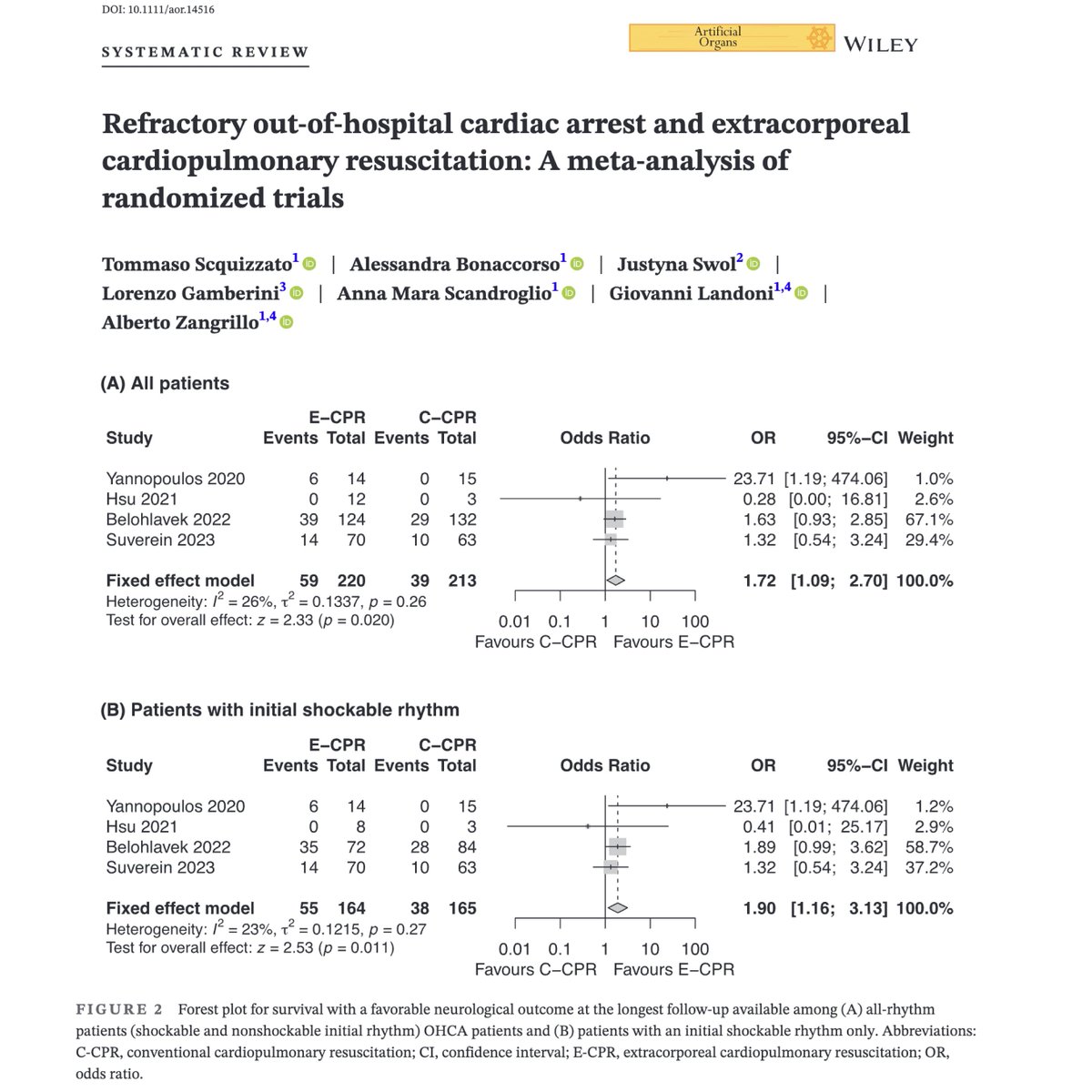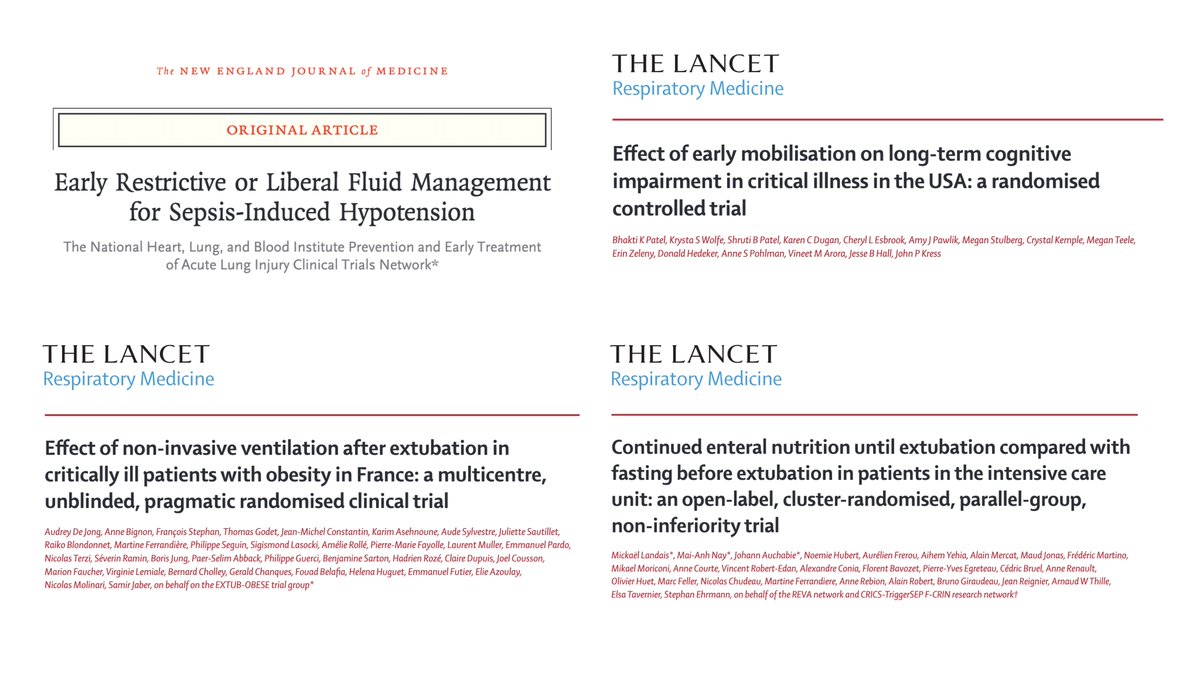
🔸ECPR improves survival with good neuro outcome🔸
We just published the first meta-analysis of 4 RCTs
➡️ More OHCA patients had good neuro outcome when randomized to #ECPR (27% vs 18%, p=0.02)
🧵 Learn more in the thread /11
🔗 onlinelibrary.wiley.com/doi/full/10.11…
#FOAMcc #ResusTwitter
We just published the first meta-analysis of 4 RCTs
➡️ More OHCA patients had good neuro outcome when randomized to #ECPR (27% vs 18%, p=0.02)
🧵 Learn more in the thread /11
🔗 onlinelibrary.wiley.com/doi/full/10.11…
#FOAMcc #ResusTwitter

2/
In refractory OHCA, VA-#ECMO during ongoing CPR, known as #ECPR, can restore and maintain organ perfusion limiting brain injury
Growing evidence suggest that this approach can improve survival and neuro outcome
#FOAMcc #ResusTwitter
In refractory OHCA, VA-#ECMO during ongoing CPR, known as #ECPR, can restore and maintain organ perfusion limiting brain injury
Growing evidence suggest that this approach can improve survival and neuro outcome
#FOAMcc #ResusTwitter

3/
After decades of evidence from non-RCTs, 3 single-center RCTs investigated #ECPR vs conventional CPR and 2 suggested a potential benefit
In 2023, the first multi-center RCT (INCEPTION) was published and showed no major differences in outcomes
#FOAMcc #ResusTwitter
After decades of evidence from non-RCTs, 3 single-center RCTs investigated #ECPR vs conventional CPR and 2 suggested a potential benefit
In 2023, the first multi-center RCT (INCEPTION) was published and showed no major differences in outcomes
#FOAMcc #ResusTwitter

4/
INCEPTION trial results contrasted with previous studies and expert opinions generating intense debate around #ECPR
Therefore, to ascertain the effect of ECPR vs conventional CPR we conducted a meta-analysis focusing on RCTs only (4 studies, 433 pts)
INCEPTION trial results contrasted with previous studies and expert opinions generating intense debate around #ECPR
Therefore, to ascertain the effect of ECPR vs conventional CPR we conducted a meta-analysis focusing on RCTs only (4 studies, 433 pts)
https://twitter.com/tscquizzato/status/1618514989010284544
5/
In our meta-analysis of RCTs, survival with favorable neuro outcome at the longest follow-up was higher with #ECPR vs conventional CPR (27% vs 18% p=0.02)
The highest benefit was observed in patients with an initial shockable rhythm (34% vs 23% p=0.01)
#FOAMcc #ResusTwitter
In our meta-analysis of RCTs, survival with favorable neuro outcome at the longest follow-up was higher with #ECPR vs conventional CPR (27% vs 18% p=0.02)
The highest benefit was observed in patients with an initial shockable rhythm (34% vs 23% p=0.01)
#FOAMcc #ResusTwitter

6/
In terms of number needed to treat (#NNT), to achieve 1 additional survivor with good neuro outcome we should treat with #ECPR
- 9 (95% CI, 5-66) pts with all-rhythm refractory OHCA
- 7 (95% CI, 4-31) with an initial VF
and favorable characteristics.
#FOAMcc #ResusTwitter
In terms of number needed to treat (#NNT), to achieve 1 additional survivor with good neuro outcome we should treat with #ECPR
- 9 (95% CI, 5-66) pts with all-rhythm refractory OHCA
- 7 (95% CI, 4-31) with an initial VF
and favorable characteristics.
#FOAMcc #ResusTwitter
7/
While we demonstrated that #ECPR improved survival with good neuro outcome, no differences in overall survival at hospital discharge or 30 days and at 3 or 6 months were found when pooling these 4 RCTs
#FOAMcc #ResusTwitter
While we demonstrated that #ECPR improved survival with good neuro outcome, no differences in overall survival at hospital discharge or 30 days and at 3 or 6 months were found when pooling these 4 RCTs
#FOAMcc #ResusTwitter

8/
All RCTs, except EROCA pilot trial, reported a consistent direction of effect in favour of #ECPR, with ARREST and Prague OHCA study reporting a statistically significant difference up to 180 days and at 30 days only, respectively
#FOAMcc #ResusTwitter
All RCTs, except EROCA pilot trial, reported a consistent direction of effect in favour of #ECPR, with ARREST and Prague OHCA study reporting a statistically significant difference up to 180 days and at 30 days only, respectively
#FOAMcc #ResusTwitter
https://twitter.com/tscquizzato/status/1496241433354936324
9/
#ECPR is highly debated due to the important resources needed despite it’s a lifesaving intervention now supported by high-quality RCTs
However, it should be noted that beneficial effects in this meta-analysis is driven by 2 RCTs in single, high-performing centers.
#FOAMcc
#ECPR is highly debated due to the important resources needed despite it’s a lifesaving intervention now supported by high-quality RCTs
However, it should be noted that beneficial effects in this meta-analysis is driven by 2 RCTs in single, high-performing centers.
#FOAMcc
10/
Implementing #ECPR in different settings/systems might fail to reproduce beneficial effects observed in this meta-analysis of single-center RCTs
ECPR is complex and requires a well-organized system, experience and a high-volume ECMO-capable cardiac arrest centers
#FOAMcc
Implementing #ECPR in different settings/systems might fail to reproduce beneficial effects observed in this meta-analysis of single-center RCTs
ECPR is complex and requires a well-organized system, experience and a high-volume ECMO-capable cardiac arrest centers
#FOAMcc
11/
Future research should aim to identify the most effective strategy to provide #ECPR based on system-level characteristics, address logistical barriers of extracorporeal CPR, and improve patient selection
#FOAMcc #ResusTwitter
Future research should aim to identify the most effective strategy to provide #ECPR based on system-level characteristics, address logistical barriers of extracorporeal CPR, and improve patient selection
#FOAMcc #ResusTwitter
If you enjoyed this thread:
1️⃣ Follow me for daily tweets or threads on resuscitation and cardiac arrest: @tscquizzato
2️⃣ Jump to the top of this thread and retweet the very first tweet:
1️⃣ Follow me for daily tweets or threads on resuscitation and cardiac arrest: @tscquizzato
2️⃣ Jump to the top of this thread and retweet the very first tweet:
https://twitter.com/tscquizzato/status/1636434978530643968
• • •
Missing some Tweet in this thread? You can try to
force a refresh















